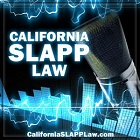SLAPP009 – Scope of Discovery after Anti-SLAPP Motion
It was a great anti-SLAPP week at Morris & Stone. Today we discuss two of our motions, and the result of last week’s Evil Yogurt Maker case. We will examine the scope of discovery following the filing of an anti-SLAPP motion, and apply those standards to a pending motion.
Specifically, I discuss the case of Britts v. Superior Court (2006) 145 Cal.App.4th 1112. In Britts, the defendant filed an anti-SLAPP motion on the same day that his opposition to a motion to compel was due. He argued that under the plain wording of CCP section 425.16(g), the motion stays all discovery “proceedings”, and therefore he was not required to file any opposition to the motion. The trial court disagreed, and granted the unopposed motion to compel, and awarded $5,000 in sanctions.
Britts took the matter up on a writ, and the Court of Appeal ordered the trial court to vacate the ruling on the motion to compel and for sanctions, holding that the statute means exactly what it says; an anti-SLAPP motion stops all discovery proceedings, including any pending discovery motions.
The trial court had also made a strange ruling (on an earlier anti-SLAPP motion in the case) that the defendant was not entitled to all the attorney fees incurred on the motion, because he had failed to meet and confer with opposing counsel. In other words, the court felt that if plaintiff’s counsel had simply been informed that one of the causes of action was a SLAPP, the complaint could have been amended and the motion avoided. That was not a holding from the case, but I explain why that reasoning is terrible and, if followed, could constitute malpractice.
I also discuss the case of Blanchard v. DirecTV (2004) 123 Cal.App.4th 903. In Blanchard, the court deliniated the scope of permissible discovery after an anti-SLAPP motion has been filed. As set forth in CCP section 425.16(g), a plaintiff must show good cause before taking ANY discovery after an anti-SLAPP motion has been filed. Good cause means ONLY discovery relevant to the Plaintiff’s burden of establishing a reasonable probability of prevailing on the claim. Discovery that is NOT relevant to a legal defense being asserted by the Defendant in the anti-SLAPP motion is not permitted.
Given that Blanchard permits only discovery related to potential defenses by the defendant, the case of Balzaga v. Fox News (2009) 173 Cal.App.4th 1325 came to the logical conclusion that if a plaintiff seeks leave to pursue discovery on a given defense, the defendant can prevent that discovery by informing the court that it is waiving that defense.
Finally, I discuss the case of Tutor-Saliba Corp v. Herrara (2006) 136 Cal.App.4th 604. This case sets forth the discretionary standard for granting leave to permit discovery following the filing of an anti-SLAPP motion, and held that a trial court’s decision to disallow discovery “will not be disturbed unless it is arbitrary, capricious, or patently ABSURD.” (Emphasis added.)
Podcast: Play in new window | Embed
Subscribe: RSS





[…] one involves a victory on the way to an anti-SLAPP victory. In Episode 9, and in this article, I discussed the case we are handling, wherein a company is attempting to use […]